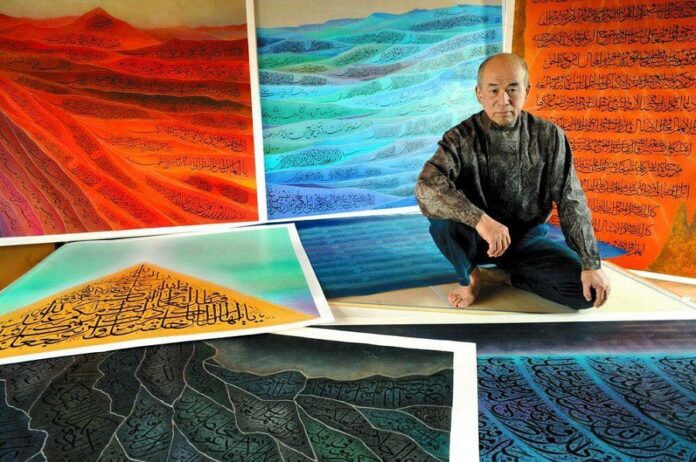DUBAI: Tokyo-born Fuad Kouichi Honda is widely recognized as one of the world’s top Arabic calligraphers and he just launched his new book, “Noor Ala Noor,” during the Abu Dhabi International Book Fair (ADIBF) 2022, underway until May 29.
The book was released in collaboration with the Islamic Arts Museum Malaysia, where a collection of Honda’s work is on display.
“The Arab and Japanese culture share common values, aesthetics and artistic practices that have always acted like a bridge of cultural communication between the two civilizations,” said Dr Ali Bin Tamim, Chairman of the Abu Dhabi Arabic Language Center, which inaugurated the book during a book launch ceremony in the UAE capital.
The book was released in collaboration with the Islamic Arts Museum Malaysia. Supplied
“Both Japanese and Arabic languages use calligraphy as a medium of artistic expression and allow calligraphers to reinvent existing styles and innovate and create new ways to personalize their creations. Their styles are based on age-old traditions developed ages ago and are passed down through the generations,” he added.
Syed Mohamad Albukhary, Director of the Islamic Arts Museum Malaysia, said: “The Islamic Arts Museum is proud to present this bilingual publication in honour of the works of Japanese calligrapher Fuad Honda. We hope that together we are able to contribute to enhancing the vision of Arabic art and Islamic calligraphy at the international level. Honda’s works of art carry the message of Arabic calligraphy throughout the world.”
The museum is home to thousands of artifacts and archaeological manuscripts from across the Muslim world that have contributed to the development of Islamic arts, particularly the art of Arabic calligraphy and the decoration of Qurans and manuscripts.
Albukhary hopes that the book, authored and translated by Dr Heba Barakat, will help spread Honda’s calligraphy to a wide spectrum of readers and art connoisseurs.
The Japanese Muslim, who teaches at Daito Bunka University, has won numerous awards for his work, including at the International Arabic Calligraphy Competition.
It was topography that inspired Honda to try his hand at calligraphy.
After graduating in Foreign Studies at Tokyo University, he joined a Japanese company that was working with the Saudi government to survey and make maps of the Arabian Peninsula. He traveled to the Kingdom in 1974 as a translator for the company. Several of the maps the company was using bore Arabic calligraphy and Honda says he fell in love with the art form. He started teaching himself to recreate the work he had seen.

